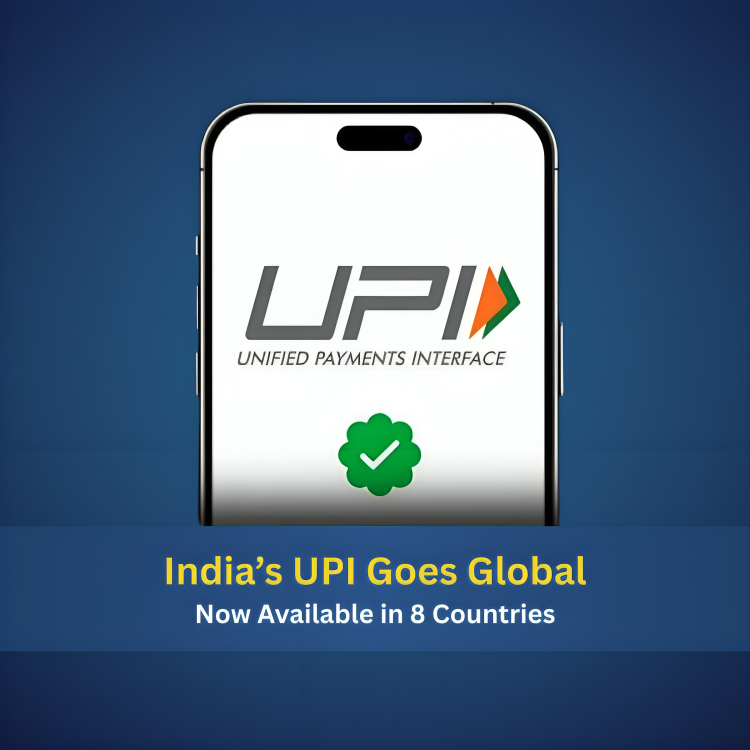Introduction
India’s homegrown digital payments platform — Unified Payments Interface (UPI) — has been a phenomenal success domestically. But now, its global ambitions are making waves internationally. The UPI global expansion is not just about technology adoption; it’s about asserting India’s financial leadership on the world stage. This strategic push is opening doors for easier remittances, trade, and travel, all while strengthening India’s global digital presence.
UPI Global Expansion: A Gateway to Financial Diplomacy
The focused keyword here is UPI global expansion, which is at the heart of this financial revolution. Through NPCI International Payments Limited (NIPL), India is actively building cross-border payment networks with multiple countries. According to the RBI’s Vision 2025 report, UPI will be expanded to over 20 countries by FY29 — with initial rollouts already live in Singapore, UAE, Mauritius, Sri Lanka, France, and Bhutan.
India’s financial diplomacy through UPI is no longer just a vision — it’s a visible and functioning reality.
7 Key Benefits of UPI Global Expansion for India and the World
1. Seamless Cross-Border Payments
With UPI integrated into international systems like PayNow (Singapore) and UAE’s Instant Payment Platform, users can now transfer money across borders instantly and at minimal cost.
2. Massive Boost for Indian MSMEs
For India’s vast MSME sector, UPI global expansion means quicker payments from international clients, reduced reliance on costly third-party processors, and seamless exports.
3. Empowering the Indian Diaspora
Indian workers abroad can now send remittances directly to family members in India using UPI-powered apps — saving time and hefty transaction fees.
4. Digital Boost for Tourism
Tourists from UPI-linked countries can make payments directly to Indian merchants, boosting tourism revenue and offering cashless ease to international travelers.
5. Financial Inclusion Across Borders
India is now helping developing nations like Namibia, Peru, and Trinidad & Tobago build UPI-like payment systems, aiding in their digital financial inclusion journey.
6. Strategic Soft Power Move
By exporting UPI as a national technology, India is building influence through innovation, enhancing its soft power in geopolitically important regions.
7. Enhanced Transparency and Security
Built on a strong regulatory framework, UPI ensures secure, traceable, and real-time transactions — a major upgrade for countries with weak digital ecosystems.
Current Collaborations: Who Has Joined Hands with India?
The following partnerships mark key milestones in UPI global expansion:
-
Singapore: Live integration with PayNow since 2023.
-
UAE: Direct linkage for cross-border payments.
-
Mauritius: UPI accepted for merchant payments and remittances.
-
France: Collaboration with Lyra for QR-based payments.
-
Nepal and Bhutan: UPI powers domestic digital payments modeled after India’s system.
-
Sri Lanka: Recently announced integration for merchant and P2P payments.
NIPL is actively engaging more countries to adopt or integrate with UPI, thereby expanding India’s fintech reach.
Challenges Facing UPI Global Expansion
While the opportunities are immense, a few obstacles remain:
-
Compliance Conflicts: Different nations have different KYC and AML norms, slowing down UPI’s full adoption.
-
Forex Management: Instant transactions across borders must comply with complex currency regulations.
-
Infrastructure Gaps: Not all partner countries are digitally ready to implement UPI-like systems at scale.
However, through Project Nexus (with Malaysia, Philippines, Thailand, and Singapore), India is leading global standardization efforts for real-time cross-border payments.
Future Outlook: UPI’s Role in India’s Global Tech Identity
The UPI global expansion reflects a larger narrative: India is no longer just adopting global tech but exporting it. By building sovereign payment rails and helping others replicate its model, India is creating a new financial blueprint for the world.
More importantly, this move strengthens India’s voice in global financial institutions and positions it as a pioneer in inclusive digital growth.
Conclusion
From simplifying remittances to enabling international MSME transactions, UPI global expansion is a bold and positive step towards reshaping India’s place in global finance. As 2025 unfolds, India is proving that fintech can be both a tool for empowerment and a symbol of global leadership.
Now is the time for Indian businesses, policymakers, and innovators to capitalize on this momentum and take the Made-in-India UPI success story worldwide.
To explore further details on UPI’s international expansion and upcoming developments, you can refer to this website from NPCI.
🔗 For more updates and stories, follow: Udyamee Magazine
Image Credit: The Economics Times









